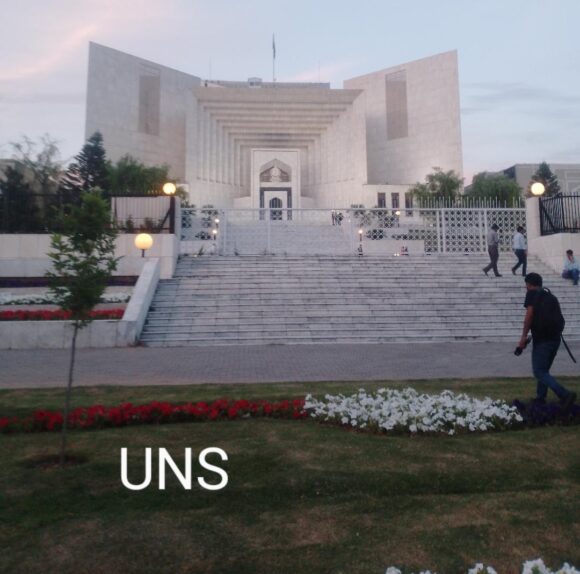ISLAMABAD -UNS: Chief Justice of Pakistan (CJP) Umar Ata Bandial said on Friday that the trial of those involved in May 9 violence should not begin in military courts without informing the Supreme Court (SC).
He made the remarks as a six-member bench, headed by him and consisting Justice Ijazul Ahsan, Justice Munib Akhtar, Justice Yahya Afridi, Justice Sayyed Mazahar Ali Akbar Naqvi and Justice Ayesha A. Malik, resumed hearing a set of pleas challenging the military trials of civilians.
During today’s hearing. Latif Khosa, the lawyer for petitioner Aitzaz Ahsan, stated that whatever was happening in the country today had taken place during the tenure of former military dictator Ziaul Haq.
“You can’t compare the present era with the era of Ziaul Haq. This is not Ziaul Haq’s era nor is martial law imposed in the country. Even if a martial law-like situation arises, we will intervene,” CJP Bandial said.
CJP Bandial said the SC should be informed before military trials of civilians begin. “The trial of the accused in military court’s should not begin without informing the SC,” he said.
At the previous hearing, the apex court had provided another opportunity to Attorney General for Pakistan (AGP) Mansoor Usman Awan to seek fresh instructions from the government about the provision of appeal against the sentence to be awarded by military courts to those found guilty of May 9 violence and arson.
The observations came when the AGP said the government was willing to follow any suggestions to improve the process of trial by military courts if the SC issued directions to ensure provision of appeal against convictions and that the sentence should be awarded with reasons.
The hearing
At the outset of the hearing, AGP Awan came to the rostrum and said that the apex court had issued him directives at the last hearing. He said that he had spoken about the “organised” plan behind the violent events of May 9.
“From the video clips shown in court, it is evident that a lot of people were involved in the events of May 9,” he said. “Despite the large number, after exercising caution, 102 people were pinpointed for court martial,” he said.
He reiterated that such an incident had occurred in the country for the very first time. He said that an airbase was attacked in Mianwali, adding that it could also have taken place at the ordnance factory.
“We have to prevent such incidents [from taking place] in the future,” the AGP said. “There is a difference between a civil crime and a crime committed by a civilian,” Awan said.
At one point, Justice Naqvi asked how it was decided who would be tried in military courts and who wouldn’t. Awan said that offences under Section 2(1)(d) of the Army Act would be tried in military courts.
“Is the Army Act outside the bounds of fundamental human rights?” asked Justice Afridi. The AGP responded in the affirmative, saying that fundamental rights were not applicable on the Army Act.
Awan argued that there was mention of the Army Act being applicable to civilians even before the 21st Amendment.
“From your arguments, it appears as if fundamental rights have ended,” Justice Akhtar remarked. He then proceeded to ask whether Parliament could amend the Army Act, to which the AGP replied in the affirmative.
“The law should be in context of fundamental rights,” Justice Akhtar said. “Your argument is that it is the state’s will to give or not give fundamental rights.”
“Fundamental rights can only be done away with through legislation. This about this,” CJP Bandial remarked. He observed that independence of the judiciary was a central part of Pakistan’s justice system.
“The SC had declared independence of the judiciary a fundamental right. We can’t leave everything to the trial court,” the CJP said.
“In 2015, the Constitution was pushed aside through the 21st Amendment. But that is not the case now,” he said.




